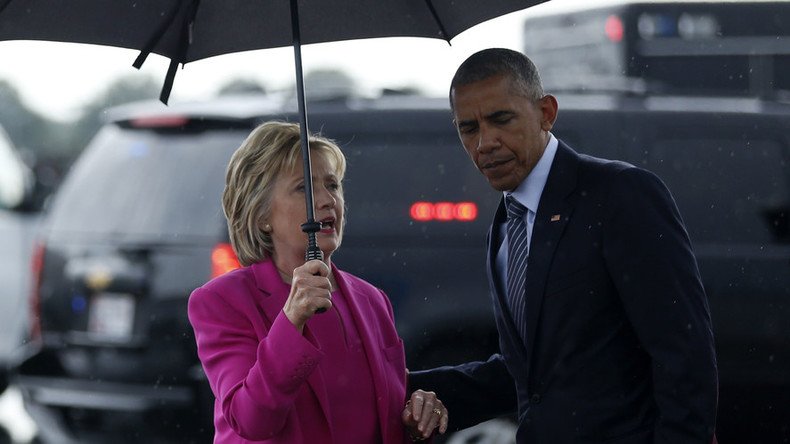Obama implicated in Clinton email scandal – New FBI docs

President Barack Obama used a pseudonym when communicating with then Secretary of State Hillary Clinton by email, while her IT company referred to her email deleting as a “cover-up”, new FBI documents reveal.
The heavily-redacted documents, almost 200 pages, include summaries of interviews with senior Clinton aides concerning the private email server, and brings to light details previously unknown.
'No wonder they couldn’t prosecute a case': Clinton staffers given immunity deals by FBI https://t.co/cqdHObOWUjpic.twitter.com/0usGzdF595
— RT (@RT_com) September 24, 2016
During the interview with Huma Abedin, who served as deputy chief of staff under Clinton, the FBI reportedly presented her with an email exchange between Clinton and a person she did not recognize. The FBI then revealed the unknown person’s name was believed to be a pseudonym used by Obama. Abedin reacted by saying, “How is this not classified?”
This exchange could expose Obama as having mislead the public on the issue, given his 2015 statement that he found out about Clinton’s use of a private email server "the same time everybody else learned it, through news reports."
FBI report reveals that Obama used a secret pseudonym to send emails Clinton and these emails ended up on her private server.
— WikiLeaks (@wikileaks) September 24, 2016
The State Department will not make public the emails Clinton exchanged with Obama, citing “presidential communications privilege,” as reason to withhold the emails under the Freedom of Information Act, Politico reports.
The documents also include interview notes with other senior Clinton aides; Cheryl Mills, Jake Sullivan and former Bill Clinton advisor Justin Cooper, who registered the clintonemail.com domain. Romanian hacker Guccifer and a number of state department officials were also interviewed.
The latest FBI document cache also refers to the engineer who used BleachBit to permanently delete emails from Clinton’s server soon after the House Benghazi Committee issued a subpoena for documents relating to the 2012 attack on the US embassy in Libya. According to the engineer, he did this “of his own accord based on his normal practices as an engineer.”
Clinton used BleachBit software to permanently wipe emails - House Oversight member https://t.co/WVGkQifV9N
— RT (@RT_com) August 26, 2016
Documents show employees from Platte River Networks, the IT company who managed Clinton’s emails, referring to a request to wipe emails in 2014 as the “Hilary [sic] cover-up operation”. An employee told the FBI this was a joke.
Clinton aide, Bryan Pagliano, said concerns were raised about whether Clinton’s server created a “federal records retention issue” by state department officials in 2009 or 2010. When he communicated these concerns to Mills, however, she said that Clinton’s predecessor, Colin Powell, had also used private email.
#HillaryClinton claims predecessor #ColinPowell advised personal email usage – report https://t.co/gJnGs0MIVRpic.twitter.com/kD3CetVTCN
— RT America (@RT_America) August 19, 2016
The reports further reveal Clinton’s alleged ineptitude with technology, with aides claiming she “could not use a computer,” and didn’t know her email password.
Abedin said she had two computers in her State Department office, one for unclassified communications and another for classified communications. She did most of her work on the unclassified computer and would go “days or weeks without logging into the classified system.”
READ MORE: Clinton's aide left classified briefing paper in Russian hotel - FBI documents
One redacted interviewee described himself as a “Clintonista” and said he has a relationship with the Clintons dating back years. He said he would meet with Clinton four or five times a day and initially traveled with her until she was comfortable with the position of secretary of state.
Hillary Clinton placing a lot of emphasis on using technology (as opposed to blunt force) to thwart terror attacks. pic.twitter.com/dlTYKKm0NM
— Jim Roberts (@nycjim) September 19, 2016
The unnamed interviewee said he only became aware of the server after receiving an email from the address, which he thought was spam. He described Clinton as a “paper person” who preferred using paper over electronic communications.
Clinton’s spokesperson, Brian Fallon, responded to the new revelations by saying the interviews “further demonstrate why the Justice Department believed there was no basis to move forward with this case.”
Three days before debate, House GOP selectively leaks details from inquiry that was closed months ago w/no charges https://t.co/bzmVNKDf6a
— Brian Fallon (@brianefallon) September 23, 2016
He also criticized the timing of the release, three days before the first debate, in a tweet. Others also questioned the timing , but for a different reason.
rt: How amazing that 189 pages of FBI docs pertaining to Clinton email probe drop on a Friday afternoon again. I’m sure just a coincidence!
— Steve Stockman (@SteveWorks4You) September 24, 2016
The Trump camp said through advisor Jason Miller, the reference to a cover-up “suggests there was a concerted effort to systematically destroy potentially incriminating information.”













